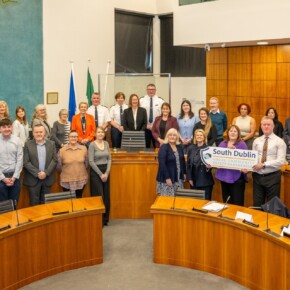Dubliner on a new mission to tackle crisis
Dublin People 27 Mar 2015Sitting in a city centre café overlooking a sparkling River Liffey on a beautiful spring morning the affable Dubliner seems to be absorbed in the view as he gazes across the quays.
“It really is a world away,
? he says almost to himself, as he relishes, for the time being at least, his visit home.
For the 44-year-old Clondalkin dad-of-two has returned from Erbil in Kurdistan where he had been involved in directing the distribution of aid to half a million refugees.
He had been working as the head of logistics and procurement with the Danish Refugee Council in Iraq for nearly a year, attempting to help the flood of displaced people fleeing the violence in Syria when a new, terrible threat emerged.
He had just returned to Erbil from Baghdad on Friday, June 6, when reports reached them that something big was happening near Mosul.
This would be the first indication that ISIS, the dreaded terror group, was marching on the northern Iraqi city.
“We returned to Erbil where we ready at a moment’s notice to get away,
? he reveals.
“The vehicles were full of fuel and ready to go. We were stocked up and keeping our eye on the situation. We knew the roads and had scouted them ahead to ensure we had an escape route.
?
It was the arrival of ISIS that had already shocked the world with their brutal imposition of a harsh Islamic state that brought a whole new level of chaos to an already chaotic situation.
“They move fast,
? Will reveals.
“There are, perhaps surprisingly, good roads through what are these remote areas and when they mount up on a 4×4 with a heavy calibre weapon on the back they can suddenly appear and cause a lot of damage.
“When they arrived in Mosul, half a million people left overnight. And nobody knew where they were heading next. Then, we thought they were moving on Erbil, and that’s when everything suddenly got very interesting.
“I’m not going to lie. Of course it was worrying, you wouldn’t be normal if you weren’t worried but you are aware of the risks and there are protocols in place that you stick to.
?
In the event, while some non-governmental organisations (NGO) pulled out of Erbil, Will and his team stayed on to help the hundreds of thousands of refugees or displaced people as they are referred to by the aid agencies.
“When the
‘Dash’ as we referred to them with black humour went on tour, it was the Kurds that stood and fought them, often in bitter hand-to-hand fighting.
“
While the situation in the area stabilised somewhat he returned to Ireland to get a new mission off the ground. And as soon as he achieves that, he’ll be back.
“It is hard to be a home relaxing when you’re aware of the work that has to be done,
? he states.
Will founded the Irish Emergency Logistics Team (IELT) in October 2013 after 20 years’ experience running private sector supply chain and logistics operations in Ireland, UK, Europe, the US, and Afghanistan.
Logistics in this case means getting supplies from food, blankets, water and everything in between to those who need it in the most efficient and speedy way possible.
While struggling to cope with the flood of refugees that had fled to Erbil from the violence in Syria, Will noticed that there were fundament faults and weaknesses in the systems already in place.
“Over the last year, in refugee and IDP camps across the whole of Iraq and Kurdistan, we saw many of the same constraints and hurdles that have to be overcome are the same over and over again.
“There were two reports done recently, one by Oxfam International, that both highlighted these same problems.
So Will has a vision to, as he puts it,
“turn things around
?.
He will spend the next few months meeting NGOs here in Ireland, selling the idea of an as yet un-tried pilot project that he is convinced, once it has been proved to work, could be broadened out across the region.
“We want to go back to the camps and train the people themselves in the basics like transport systems, distribution, warehouse skills, procurement and safety stuff. We don’t want to put them on the moon; we just need to help them to the point where they can take care of themselves.
?
“The idea is basically summed up in the proverb,
‘give a man a fish and you feed him for a day, teach a man to fish and you feed him for a lifetime’.
As part of the process to he is also involved in an
‘Introduction to Humanitarian Logistics’ course in Kimmage Development Studies Centre.
“The rest of this year and next year will see more upheaval in the region, not less,
? he predicts.
“But if we can make this work then it should make a real difference.
?











